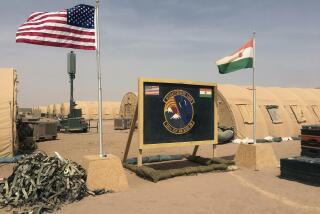Strike Ended at Key Air Base in Turkey : Military: The government orders the walkout halted, clearing the way for American flights.
- Share via
INCIRLIK AIR BASE, Turkey — To the relief of American military personnel facing possible combat in Iraq--and facing mounds of garbage as well--the Turkish government Friday ordered striking workers back to their jobs at this big air base in southern Turkey.
Janitors, secretaries, gardeners, trash collectors, service station attendants, drivers and other support personnel, all members of the Harb-Bis Sendika, or War Workers’ Union, trudged glumly back to work under government orders.
The 1,800 men and woman were ordered back a day after Secretary of State James A. Baker III won permission from Turkish leaders to use bases here in the event of hostilities with Iraq.
Incirlik, near Adana on the southern coast of Turkey, is the only U.S. tactical air base between Italy and the Far East. The name in Turkish means “fig orchard,” but the base is best remembered as the takeoff point for Francis Gary Powers, whose U-2 reconnaissance plane was shot down in the Soviet Union in May, 1960.
Military analysts consider Incirlik ideally situated for air operations against Iraq. It has a 10,000-foot runway capable of handling aircraft of all kinds, and its ground staff is equipped and fully trained for chemical warfare.
“It’s a superb location,” a military specialist said. “Between Incirlik and Riyadh (the capital of Saudi Arabia, where U.S. aircraft have been deployed this week) you have awful nice coverage of the Middle East. It would be nice to come in on (Iraqi President) Saddam Hussein from both directions. Real nice.”
The state of U.S. preparedness has been threatened in the past few days by the strike of base workers here and at nearly a dozen other military facilities in Turkey. U.S. military personnel who should have been preparing for war have been forced to clean toilets, make coffee, type letters and water the nine-hole golf course--tasks normally performed by Turks.
“Garbage was everywhere,” said Staff Sgt. Kevin Ault, 28, a munitions specialist. “Some of the strikers dumped it on the parking lots to make it look worse.”
Ault said families were told to stockpile a two weeks’ supply of food to guard against shortages caused by the strike.
A civilian worker, Mustafa Sonis, said: “They were really suffering at the base. The grass was not cut, their houses were smelly, and they were having trouble getting food.”
Most of the workers were not pleased to be ordered back to work, especially because they did not get the 160% pay increase they had demanded. But union leader Mustafa Acet pledged that the workers would be back on the street after the Middle East crisis is over.
After all, he said, he and the other workers were trained in union organizing 20 years ago by a special mission of the U.S. Agency for International Development.
Relief was palpable in the American community Friday morning when the government, citing emergency provisions of the Turkish constitution, went on national radio to call a halt to the strike.
“Strike’s over! Strike’s over!” Air Force Master Sgt. Pete Hemister shouted as he burst into Tim’s Copper Plaques, one of the leather shops, bars and souvenir stores just outside the base.
Despite the threat of action, Air Force personnel said they were working routine schedules. All morning Friday, only three aircraft landed at Incirlik.
One of the American servicemen said, “I’ll know we are on alert when they issue our gas masks and make us carry them everywhere.”
More to Read
Sign up for Essential California
The most important California stories and recommendations in your inbox every morning.
You may occasionally receive promotional content from the Los Angeles Times.













